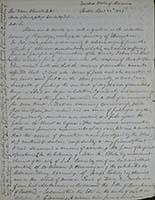Identificatie
referentie code
Titel
Datum(s)
- 24 Apr. 1849 (Vervaardig)
Beschrijvingsniveau
Omvang en medium
4 pp
Context
Naam van de archiefvormer
archiefbewaarplaats
Geschiedenis van het archief
Directe bron van verwerving of overbrenging
Inhoud en structuur
Bereik en inhoud
Boston, USA - CTJ's place in the history of the inductive science of physiology, relating to the discovery of etherism. He gives an account of his experience with ether. His experiments 'led me to conclude that the nerves of sensation were paralysed by the ether, and I ventured to declare confidently to my friends, that I had discovered a means of averting the pain of surgical operations'. CTJ wants WW to sanction his claim as the discoverer of the application of ether in surgical operations.
Waardering, vernietiging en slectie
Aanvullingen
Ordeningstelsel
Voorwaarden voor toegang en gebruik
Voorwaarden voor raadpleging
Voorwaarden voor reproductie
Taal van het materiaal
Schrift van het materiaal
Taal en schrift aantekeningen
Fysieke eigenschappen en technische eisen
Toegangen
Verwante materialen
Bestaan en verblifplaats van originelen
Bestaan en verblijfplaats van kopieën
Related units of description
Aantekeningen
Aantekening
William T G Morton, a student of CTJ's, had demonstrated to a group of students and physicians in October 1846 the use of ether as a general anesthetic, and applied for a patent. CTJ in turn claimed he had discovered it. He also claimed to have told Samuel F. B. Morse the principles of the electric telegraph which Morse had patented in 1840. In 1873 he was committed to McLean Hospital as mentally ill. See his entry in the DSB by George E. Gifford, Jr., Vol. VII, pp. 44-46]

